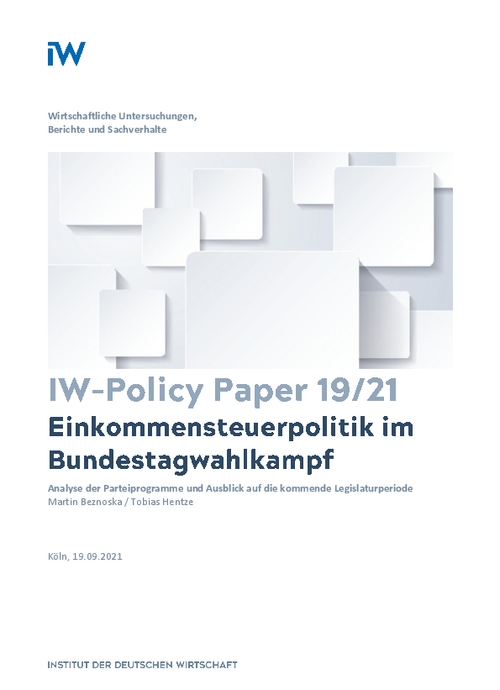Income tax policy plays a relevant role in the election programs for the German federal election 2021. According to the election programs, basically all parties are aiming for relief for small and medium incomes and for households with children.

Income tax policy in the federal election campaign: Analysis of the party programs and outlook for the coming legislative period

Income tax policy plays a relevant role in the election programs for the German federal election 2021. According to the election programs, basically all parties are aiming for relief for small and medium incomes and for households with children.
But that is where the similarities end: While the CDU/CSU and, above all, the FDP want to reduce or at least not increase the burden across all income groups, the SPD, the Greens and the Left call for a higher burden for taxpayers with high incomes. Depending on the party, for a single person these high incomes start at 80,000 euros to 120,000 euros.
Another difference concerns the family image. The SPD, the Greens and the Left are planning tax increases for married couples in which the employment and, as a result, the earnings of the spouses differ by abolishing or restricting the joint tax assessment. The goal is to motivate second earners, and thus especially wives, to work more. A grandfathering of existing marriages could dampen the effect or shift the effect to the future. However, grandfathering would lead to the questionable situation that two married couples with identical incomes would pay different amounts of taxes - depending on the year of marriage. In return, families would be compensated by the introduction of the “Kindergrundsicherung” – a new basic child benefit. The analysis shows that a combined introduction of both reforms would leave an additional burden on families with incomes above a gross household income of about 100,000 euros, while families with lower incomes would be relieved. The CDU/CSU and FDP, on the other hand, want to retain the existing joint tax assessment and the current child benefit and child allowance.
Depending on the outcome of the election, income tax policy could become a bone of contention in the coalition negotiations. This applies in particular to the question of the extent to which taxpayers with higher incomes should be relieved or burdened and how marriage should be taxed in the future. If agreement is reached on an income tax reform, it can be assumed that households with small and medium incomes will benefit in particular. Households with children can also expect relief overall. In the case of new marriages, single-earner families could pay higher taxes overall. Additional burdens are also conceivable for top earners and married couples without children.
Given the budgetary situation as a result of the Corona pandemic, there could be restrictions to implement a structural reform in one fell swoop. Instead, changes could be spread out over time to smooth the revenue effect. However, it is also not impossible that, with reference to debt levels and the debt brake, income taxpayers will once again not see any relief after the 2021 federal election.

Income tax policy in the federal election campaign: Analysis of the party programs and outlook for the coming legislative period

More on the topic

Global and European corporate tax reform concepts
The harmonization of corporate taxation at an international level has been on the political agenda for many years. Both the Organization for Economic Cooperation and Development (OECD) and the European Commission have presented reform projects in this regard, ...
IW
The Challenges to the Sustainability of Germany’s Public Finances
The German government’s fiscal responses to the Covid-19 pandemic and the Ukraine war in an attempt to cushion their impact have driven up the country’s general government debt-to-GDP ratio.
IW